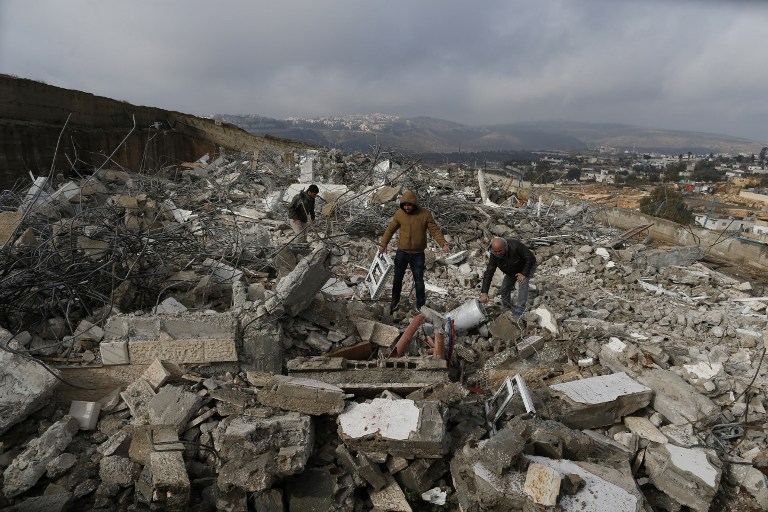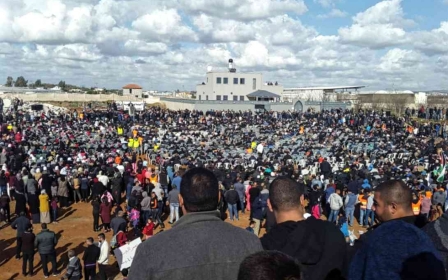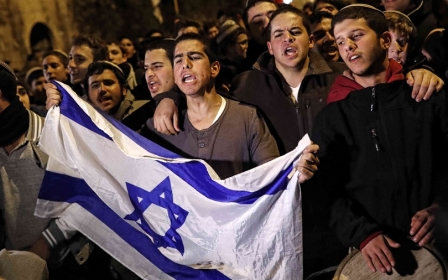The demolition of Palestinian homes in Israel is an ongoing Nakba

Around 70,000 Palestinian families within Israel live in constant anxiety and fear that Israeli authorities will execute a demolition order and tear down their homes. These families truly live in a continuous Nakba.
Within one night, with authorities undeterred by the cries of children, nor the cold wave sweeping the country, the families were made homeless
This is exactly what happened last week to 11 Palestinian families from the city of Qalanswah, located within the Triangle, a concentration of Palestinian towns inside Israel. On the evening of 9 January 2017, these families were informed of the authorities’ intention to demolish their homes.
The following morning, Israeli bulldozers moved in, accompanied by thousands of policemen and border guards, in order to execute the demolition orders.
READ: Demolition of Palestinian homes sparks protests in Israel
The authorities did not give the home owners a chance to approach the courts and request the suspension of the demolition orders. They were not even given time to manage their affairs and find temporary shelter.
Within one night, with authorities undeterred by the cries of children, nor the cold wave sweeping the country, the families were made homeless.
A history of demolitions
The issue of house demolition inside Israel is not new. It is an old wound, first opened by the Nakba itself in 1948 when Israel, using all its arms and tools, destroyed more than 500 Palestinian towns, demolishing the houses within them and banishing around 750,000 of their inhabitants.
Only 150,000 Palestinians remained in the country at the time. Israel treated them as enemies and regarded their continued presence - and not taking the chance to displace them when they could - a historic error that should be “corrected” by harassing them and encouraging them to emigrate. House demolitions have been one of the tools to achieve this objective.
The measures used are consistent with the recommendations of the Koenig memorandum, a confidential, internal Israeli government document written in 1976 - and later leaked - that discussed how the Israeli government should deal with the indigenous Palestinian population remaining in the country, and one which many believe is the foundation for Israeli policies towards Palestinians today.
One of the memo's recommendations talked about “implementing the law” by demolishing unlicensed homes and levying heavy fines on their owners so as to preoccupy them and distract them from struggling for their national rights.
Many Palestinians who live inside Israel build their houses on their own lands but without licenses which Israeli authorities refuse to grant them. So they are left with no other options but to build illegally, leaving them subject to heavy fines which can be as high as hundreds of thousands of shekels, or even being sent to prison.
Home owners are often indicted several times related to the same case, sometimes years after houses were first constructed. These cases are not dropped even with time.
Precarious housing
The right to housing in Israel is designated as a basic right when it comes to Jews. The government and its official and semi-official institutions dedicate themselves to the fulfilment of this right and to securing safe homes for every Jewish family.
Yet when the matter relates to the Palestinian citizens of Israel, it is a completely different matter. The Palestinian citizen remains preoccupied with securing a roof for himself in the hope of being able to lead a normal life, but he can never guarantee the security of his home, which may end up being torn down at any time.
In this way, the government endeavours to preoccupy Palestinian citizens with the struggle for their basic living needs distracting them from demanding their collective national rights.
This has been going on since the creation of the state of Israel. According to official statistics, hundreds of Palestinian homes are demolished every year within Israel: in the Galilee, in the Triangle and the Negev. As a result, thousands of young Palestinian men in Israel keep postponing their plans to get married until they are able to build houses for themselves. This often leads to problems and tensions within families.
Inside Israel, dozens of villages and Bedouin sites in the Negev and the Galilee - where around 90,000 Palestinian citizens now live - have been in existence for many decades. Yet Israel refuses to recognise them or supply them with water and electricity or other basic services, instead issuing all of them with demolition orders.
One such place is the Bedouin village of Umm Al-Hayran, which has been threatened by the Israeli government with demolition and its inhabitants with banishment in order to make room for a Jewish town on its remains called Hiran.
Less land, more bans
The population of Palestinian inhabitants in Israel has multiplied around eight times since the Nakba, yet the land under their control has continued to shrink, confiscated from them by the power of a variety of laws.
Today, Palestinians make up about 20 percent of the population of Israel, but control no more than 3 percent of the land. Two-thirds of what they own is for housing while one-third is for farmland. More than 1,000 new towns have been built since Israel came into existence: all of them are Jewish. In contrast, not a single new Palestinian town was built while Palestinians were banned from living in about 70 percent of Israeli towns.
This is done by virtue of the amendment to the Admissions Commitees Law that was passed by the Knesset. According to this law, an approval committee is assigned to each of these towns whose task is to look into housing applications. It is not a coincidence that these committees have not approved a single housing application by any Palestinian family under the pretext that none of these families were suitable for living in those towns. The Israeli Supreme Court has rejected the appeals that question the constitutionality and legitimacy of the amendment to the law.
The recent spell of Palestinian home demolitions follows threats Israeli Prime Minister Benjamin Netanyahu made last month when he said that, as a result of the Israeli court-ordered evacuation of the illegal Israeli settlement of Amona in the West Bank, he would retaliate against Palestinians citizens and tear down their homes in the Triangle, in the Galilee and in the Negev. Netanyahu's justification for this action was that it would establish equality in “applying the law”.
Clearly, the prime minister ignored the vast difference between the two sides. Palestinian citizens happen to be the original inhabitants of the country and all they have been asking for is to be permitted to build their homes on lands that belong to them. In contrast, the Amona settlers built their settlement on land belonging to Palestinian citizens; they stole it from them in broad daylight.
Despite that, the Israeli government has done its best to help the Amona settlers and legitimise the theft they perpetrated.
Systematic discrimination
In order to obtain a building license, a home owner must obtain a legal endorsement of their architectural plans. Such endorsements are issued by the Interior Ministry’s organisation and construction committees, whose task is to ensure that the needs of each town are provided for. Except in very rare cases, the members of these committees are exclusively Jewish.
The endorsement of plans in Jewish towns usually takes a few years whereas in the case of Palestinian towns in Israel it can take up to 20 years. Jewish architectural plans receive full government assistance as well as support from a variety of institutions including Israel Land Administration and the Jewish National Fund, but these same agencies spare no effort to create obstacles in order to foil architectural plans destined for Palestinian towns.
Consequently, Palestinian citizens are left with no option but to build their homes on their own lands without licenses. In this way, the Israeli government finds justification to pursue them, threaten them with demolitions and charge them with breaking the law or accuse them of not respecting the rule of law.
Step by step, Palestinian towns have been transformed into what look like ghettos that are under siege from all sides. The Israeli government accomplished this result after seizing control over around 93 percent of the land, including lands belonging to the displaced Palestinians and lands confiscated from Palestinian citizens. These towns are surrounded by land administered by the Israel Land Administration.
As such, it is almost impossible to extend the building area within Palestinian towns. Local Palestinian authorities often become subject to political blackmail in order to be granted permission to expand the area of land under their control.
Palestinian citizens of Israel respond to the demolition of houses with demonstrations and hunger strikes. From time to time, they rebuild their demolished houses. In many instances, they gather in one of the houses destined to be ripped down to try to obstruct the process which cannot hold back the Israeli goverment's insistence that these demolitions move forward.
The demolition of Palestinian homes in Israel is neither a legal issue, nor an issue of licenses. It is a national issue, an issue of the original inhabitants who are not only being racially discriminated against, but have, since the Nakba, also been subject to an attempt at racial, cultural and historic cleansing.
Therefore, the solution lies outside the Israeli court system, and instead in the international protection for Palestinian inhabitants inside Israel.
- Jihad Abu Raya is a Palestinian lawyer and activist based in northern Israel. He is a founder of the Falastenyat Movement.
The views expressed in this article belong to the author and do not necessarily reflect the editorial policy of Middle East Eye.
Photo: Palestinian men look for salvageable items amid the rubble of a house that was demolished by Israeli army bulldozers in the Palestinian East Jerusalem neighbourhood of Beit Hanina on 4 January 2017 on the grounds that it was built without a construction permit (AFP)
Middle East Eye propose une couverture et une analyse indépendantes et incomparables du Moyen-Orient, de l’Afrique du Nord et d’autres régions du monde. Pour en savoir plus sur la reprise de ce contenu et les frais qui s’appliquent, veuillez remplir ce formulaire [en anglais]. Pour en savoir plus sur MEE, cliquez ici [en anglais].





